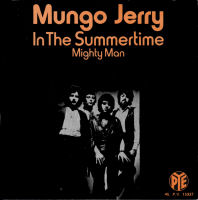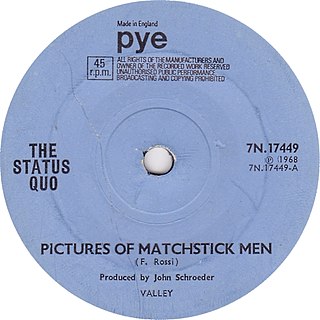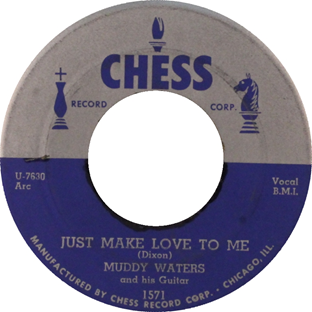Related Research Articles

"Seasons in the Sun" is an English-language adaptation of the 1961 Belgian song "Le Moribond" by singer-songwriter Jacques Brel with lyrics rewritten in 1963 by American singer-poet Rod McKuen portraying a dying man's farewell to his loved ones. It became a worldwide hit in 1974 for Canadian singer Terry Jacks and became a Christmas number one in the UK in 1999 for Westlife.

Status Quo are a British rock band. The group originated in London and was founded in 1962 by Francis Rossi and Alan Lancaster while they were still schoolboys. After a number of name and lineup changes, which included the introduction of John Coghlan in 1963 and Rick Parfitt in 1967, the band became The Status Quo in 1967 and Status Quo in 1969. As of 2022, the group have been active for 60 consecutive years.

"Born to Be Wild" is a song written by Mars Bonfire and first performed by the band Steppenwolf. It is often invoked in both popular and counter culture to denote a biker appearance or attitude. It is most notably featured in the 1969 film Easy Rider. Sometimes, "Born to Be Wild" is described as the first heavy metal song, and the second-verse lyric "heavy metal thunder" marks the first use of this term in rock music.
"Good Vibrations" is a song by American group Marky Mark and the Funky Bunch featuring Loleatta Holloway. It was released in July 1991 as the lead single from their debut album, Music for the People (1991). The song became a number-one hit in the United States, Denmark, Sweden and Switzerland.

"In the Summertime", released in 1970, is the debut single by British rock band Mungo Jerry. It reached number one in charts around the world, including seven weeks on the UK Singles Chart, two weeks on one of the Canadian charts, and number three on the Billboard Hot 100 singles chart in the US. It became one of the best-selling singles of all-time, eventually selling 30 million copies. Written and composed by the band's lead singer, Ray Dorset, while working in a lab for Timex, the lyrics of the song celebrate the carefree days of summer. The track was included on the second album by the band, Electronically Tested, issued in March 1971.

"December, 1963 " is a song originally performed by the Four Seasons, written by original Four Seasons keyboard player Bob Gaudio and his future wife Judy Parker, produced by Gaudio, and included on the group's album Who Loves You (1975).

"Staring at the Sun" is a song by Irish rock band U2. It is the fifth track on their 1997 album, Pop, and was released by Island Records as the album's second single on 14 April 1997. The song peaked at number three on the UK Singles Chart, number one in Canada and Iceland and number 26 on the US Billboard Hot 100. In the US, it topped the Billboard Modern Rock Tracks and Adult Alternative Songs charts. It also reached the top 10 in Finland, Ireland, Italy, New Zealand and Norway.

"Celebration" is a 1980 song by American band Kool & the Gang. Released as the first single from their twelfth album, Celebrate! (1980), it was the band's first and only single to reach No. 1 on the US Billboard Hot 100.

"Pictures of Matchstick Men" is the first hit single by British rock band Status Quo, then named the Status Quo. It was released on 5 January 1968.

"Green Tambourine" is a song written and composed by Paul Leka and Shelley Pinz. It was the biggest hit by the 1960s Ohio-based rock group the Lemon Pipers, as well as the title track of their debut album, Green Tambourine. The song was one of the first psychedelic pop chart-toppers and became a gold record.

"Play That Funky Music" is a song written by Rob Parissi and recorded by the band Wild Cherry. The single was the first released by the Cleveland-based Sweet City record label in April 1976 and distributed by Epic Records. The performers on the recording included lead singer Parissi, electric guitarist Bryan Bassett, bassist Allen Wentz, and drummer Ron Beitle, with session players Chuck Berginc, Jack Brndiar (trumpets), and Joe Eckert and Rick Singer (saxes) on the horn riff that runs throughout the song's verses. The single hit No. 1 on the Billboard Hot 100 on September 18, 1976; it was also No. 1 on the Billboard Hot Soul Singles chart. The single was certified platinum by the Recording Industry Association of America for shipments of over 2 million records and eventually sold 2.5 million in the United States alone.

"Yesterday Once More", written by Richard Carpenter and John Bettis, is a hit song by the Carpenters from their 1973 album Now & Then. Thematically the song concerns reminiscing about songs of a generation gone by. It segues into a long medley, consisting of eight covers of 1960s tunes incorporated into a faux oldies radio program. The work takes up the entire B-side of the album.

"The Wanderer" is a song written by Ernie Maresca and originally recorded by Dion, released on his 1961 album Runaround Sue. The song, with a 12-bar blues-base verse and an eight-bar bridge, tells the story of a travelling man and his many loves. The song is ranked number 243 on the Rolling Stone magazine's list of The 500 Greatest Songs of All Time.

"Down Down" is a song by English rock band Status Quo. Written by Francis Rossi and Bob Young and produced by Status Quo, "Down Down" was Status Quo's only number one single on the UK Singles Chart. The single spent a week at the top of the chart in January 1975. It was released on 29 November 1974 on the Vertigo label, paired with the B-side song "Nightride". Both songs came from the album On the Level, which had yet to be released. The album version lasts 5 minutes and 24 seconds, whilst the single version is 3 minutes and 49 seconds.

"I Just Want to Make Love to You" is a blues song written by Willie Dixon. In 1954, it was recorded by Muddy Waters, and released as a single with the title "Just Make Love to Me". The song reached number four on Billboard magazine's R&B Best Sellers chart.

"Tired of Waiting for You" is a song by the English rock band the Kinks. It was released as a single on 15 January 1965 in the UK and on 17 February 1965 in the US. The single reached number one in the UK and number six in the US. It then appeared on their second studio album, Kinda Kinks. It was the group's highest-charting single in the US - tied with "Come Dancing", which achieved the same chart position eighteen years later in 1983.
"I (Who Have Nothing)" (sometimes billed as "I Who Have Nothing") is an English language cover of the Italian song "Uno dei Tanti" (English: "One of Many"), with music by Carlo Donida and lyrics by Giulio "Mogol" Rapetti. The initial version, "Uno dei Tanti", was performed by Joe Sentieri in 1961. The song first recorded in English by Ben E. King in 1963 with new lyrics by Jerry Leiber and Mike Stoller.
"Down the Dustpipe" is a song written by Australian singer-songwriter Carl Groszmann, and recorded by Status Quo.
"Paper Plane" is a rock song originally by Status Quo. It was released as a single on 10 November 1972, reaching number 8 in the UK Singles Chart, and appeared on their album, Piledriver. The song was written by Francis Rossi and Bob Young.
"Caroline" is a single released by the British rock band Status Quo in 1973. It was included on the band's 1973 album Hello!
References
- 1 2 Strong, Martin C. (2000). The Great Rock Discography (5th ed.). Edinburgh: Mojo Books. pp. 927–929. ISBN 1-84195-017-3.
- ↑ "Album review by Robert Aniento". Allmusic.com. Retrieved 1 January 2009.
- 1 2 Roberts, David (2006). British Hit Singles & Albums (19th ed.). London: Guinness World Records Limited. p. 526. ISBN 1-904994-10-5.
- ↑ "Status Quo Ice In The Sun Chart History". Billboard . Archived from the original on July 10, 2018.
- ↑ Kent, David (1993). Australian Chart Book 1970–1992 (illustrated ed.). St Ives, N.S.W.: Australian Chart Book. ISBN 0-646-11917-6.
- ↑ "Status Quo – Ice in the Sun" (in Dutch). Ultratop 50. Retrieved 14 August 2021.
- ↑ "Status Quo – Ice in the Sun" (in French). Ultratop 50. Retrieved 14 August 2021.
- ↑ "RPM Top 100 Singles - October 21, 1968" (PDF).
- ↑ "Status Quo – Ice in the Sun" (in German). GfK Entertainment charts. Retrieved 14 August 2021.
- ↑ "The Irish Charts – Search Results – Ice in the Sun". Irish Singles Chart. Retrieved 14 August 2011.
- ↑ "Official Singles Chart Top 100". Official Charts Company.